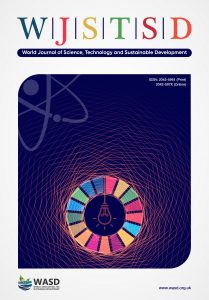The determinants of food security in Sudan: the case of Kassala state, Prof. Samia Nour and Dr. Eltayeb Abdalla
 Prof. Samia Satti Osman Mohamed Nour
Prof. Samia Satti Osman Mohamed Nour
Department of Economics, Faculty of Economic and Social Studies
University of Khartoum, Khartoum
Sudan
Email: samiasatti@yahoo.com
Dr. Eltayeb Mohamedain Abdalla
Department of Economics
University of Kassala, Kassala
Sudan
DOI: 10.1108/WJSTSD-10-2020-0084
Purpose: This paper aims to discuss the determinants of food security in Kassala state using the measurement of Household Food Insecurity Access Scale (HFIAS). We use the measurement of HFIAS and use new primary data from a food security household survey in Kassala state (2019).
Design/methodology/approach: This paper focuses on the determinants of food security in Kassala state using the measurement of Household Food Insecurity Access Scale (HFIAS), using new primary data from a food security household survey in Kassala state (2019) and using the multinomial logistic regression analysis and both ordered logit and ordered probit regression to examine the determinants of food security.
Finding: Our results are in support of our hypothesis that the significant determinants of household food insecurity are family-owned production (that negatively affects the probabilities of household being food insecure), household income (that negatively affects HFIAS). We observe that the effects of family-owned production on household food insecurity are particularly significant in the case of mildly and moderately food insecurity. We explain that the other factors that affect the household food insecurity include improvement in the level of agricultural services, marketing, banking services and road characteristics that reduce HFIAS. We find a gender gap related to food security in the sense that male-headed households produce more food compared to female-headed households and also families headed by males are more likely food secure. Therefore, the major policy implication from our results is the importance of increasing households income and enhancing family own production of food to eliminate food insecurity.
Originality/value: This paper provides a significant contribution to the Sudanese and international literature because it discusses the determinants of food security in Kassala state. Different from the two other accompanying papers that focused on the incidence of food security in Kassala state using the measurement of Household Food Insecurity Access Scale (HFIAS) and the determinants of production of food and consumption of food in Kassala state, this paper focuses on the determinants of food security in Kassala state using the measurement of HFIAS and using new primary data from a food security household survey in Kassala state (2019). We fill the gap in the Sudanese literature because we provide a more interesting analysis of the determinants of food security in Kassala state. Our analysis is useful from policy perspective since we provide useful policy recommendations to enhance food security through agricultural development in Kassala state.
Keywords: Sudan; Food security; Food production; Agricultural development; Kassala.
Citation: Mohamed Nour, S.S.O. and Abdalla, E.M. (2021), "The determinants of food security in Sudan: the case of Kassala state", World Journal of Science, Technology and Sustainable Development, Vol. 18 No. 3, pp. 285-302. https://doi.org/10.1108/WJSTSD-10-2020-0084

